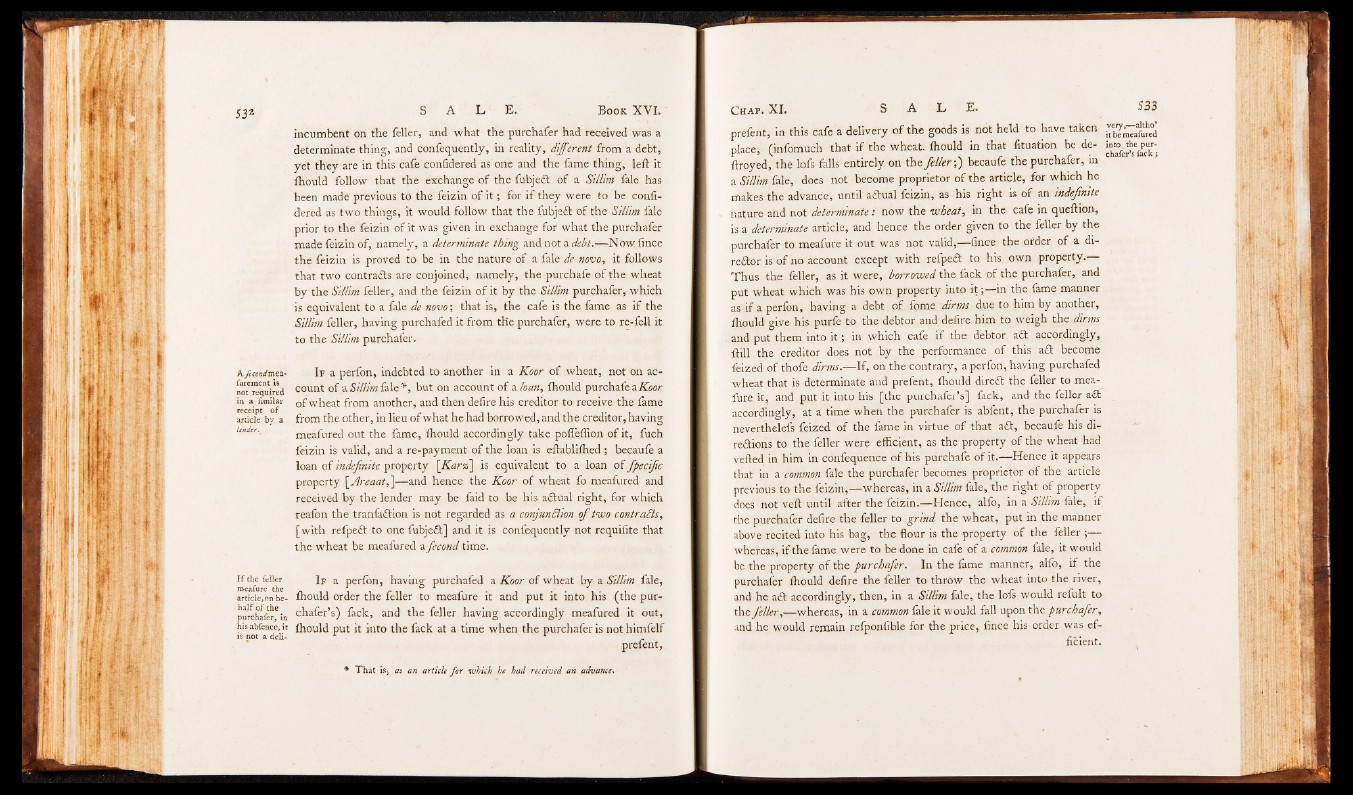
A fécondmea*
furement is
not required
in a fimilar
receipt of
article by a
lender.
I f the feller
meafure the
article, on behalf
of the
purchafer, in
his abfence, it
is not a deliincumbent
on the feller, and what the purchafer had received was a
determinate thing, and confequently, in reality, different from a debt,
yet they are in this cafe confidered as one and the fame thing, left it
fhould follow that the exchange of the fubjeft of a Sillim fale has
been made previous to the feizin of i t ; for if they were to be confidered
as two things, it would follow that the fubjeft of the Sillim fale
prior to the feizin of it was given in exchange for what t-he purchafer
made feizin of, namely, a determinate thing and not a debt.— Now. fince
the feizin is proved to be in the nature of a fale de novo, it follows
that two contrafts are conjoined, namely, the purchafe of the wheat
by the Sillim feller, and the feizin of it by the Sillim purchafer, which
is equivalent to a fale de novo; that is, the cafe is the fame as if the
Sillim feller, having purchafed it from the purchafer, were to re-fell it
to the Sillim purchafer.
If a perfon, indebted to another in a Koor of wheat, not on account
of Sillim {A c*, but on account of a loan, ftiould purchafe a Koor
of wheat from another, and then defire his creditor to receive the fame
from the other, in lieu of what he had borrowed, and the creditor, having
meafured out the fame, fhould accordingly take pofieflion of it, fuch
feizin is valid, and a re-payment of the loan is eftablifhed ; becaufe a
loan of indefinite property [Kar%\ is equivalent to a loan of fpecific
property \Areaatj\— and hence the Koor of wheat fo meafured and
received by the lender may be faid to be his aftual right, for which
reafon the tranfaftion is not regarded as a conjunction o f two contracts,
[with refpeft to one fubjeft] and it is confequently not requifite that
the wheat be meafured a fecond time.
If a perfon, having purchafed a Koor of wheat by a Sillim fale,
fhould order the feller to meafure it and put it into his (the pur-
chafer’s) fack, and the feller having accordingly meafured it out,
fhould put it into the fack at a time when the purchafer is not himfelf
prefent,
* T h a t is, as an article fa r which he had received an advance.
prefent, in this cafe a delivery of the goods is not held to have taken
place, (infomuch that if the wheat, fhould in that fituation be de-
ftroyed, the lofs falls entirely on the feller;) becaufe the purchafer, in
a Sillim fale, does not become proprietor of the article, for which he
makes the advance, until aftual feizin, as his right is of an indefinite
nature and not determinate; now the wheat, in the cafe in queftion,
is a determinate article, and hence the order given to the feller by the
purchafer to meafure it out was not valid,— fince the order of a director
is of no account except with refpeft to his own property.—
Thus the feller, as it were, borrowed the fack of the purchafer, and
put wheat which was his own property into i t ;—in the fame manner
as if a perfon, having a debt of fome dirms due to him by another,
fhould give his purfe to the debtor and defire him to weigh the dirms
and put them into it \ in which cafe if the debtor aft accordingly,
ftill the creditor does not by the performance of this aft become
feized of thofe dirms.— If, on the contrary, a perfon, having purchafed
wheat that is -determinate and prefent, fhould direft the feller to meafure.
it, and put it into his [the purchafer’s] fack, and the feller aft
accordingly, at a time when the purchafer is abfent, the purchafer is
nevertheless feized of the fame in virtue of that aft, becaufe his di-
reftions to the feller were efficient, as the property of the wheat had
vefted in him in confequence of his purchafe of it.— Hence it appears
that in a common fale the purchafer becomes proprietor of the article
previous to the feizin,— whereas, in a Sillim fale, the right of property-
does not veft until after the feizin.— Hence, alfo, in a Sillim fale, if
the purchafer defire the feller to grind the wheat, put in the manner
above recited into his bag, the flour is the property of the feller ;—
whereas, if thefame were to be done in cafe of a common fale, it would
be the property of the purchafer. In the fame manner, alfo, if the
purchafer fhould defire the feller to throw the wheat into the river,
and he aft accordingly, then, in a Sillim fale, the lofs would refult to
the feller,— whereas, in a common fale it would fall upon the purchafer,
and he would remain refponfible for the price, fince his order was efficient.
■1
i s
iti i | 1 III III
i l f i l l
l i